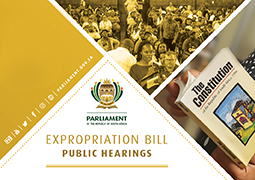
Ekurhuleni residents have informed the Portfolio Committee on Public Works and Infrastructure that the expropriation of land will effectively reduce poverty, curb the spread of diseases like Covid-19 and prevent dangerous fires in informal settlements.
Residents from various communities in the Gauteng Province told the committee during its public hearings on the Expropriation Bill in Ekurhuleni yesterday that they have been living in shacks prior to democracy without any improvements made to their communities since 1994.
They said ife in informal settlements is unbearable, particularly for the elderly and children and based on that, they called on Parliament to speed up the implementation of the Expropriation Bill and to give them land for housing, farming and economic empowerment.
They further warned Parliament that people living in shacks are unable to implement Covid-19 social distancing and sanitisation regulations due to overcrowding in all settlements throughout Gauteng. Expropriation of land, according to them, was not only about returning land to its rightful owners, but also provides the state with an opportunity to expand social services such as building clinics, hospitals and police stations.
Youth structures again called on Parliament to ensure that projects are implemented to train them to work the land and become economically active through farming. If this is done correctly, the country will also be assured of future food security, they claimed.
Farmers, including small-scale farmers who spoke at the public hearings, confirmed their appreciation and support for the Expropriation Bill. They proposed that a proper expropriation process be adopted. Firstly, land owned by the government must be distributed to the people while land that is expropriated must be used for development of housing, industrial and agricultural farming projects.
Secondly, they proposed that hectares lying idle on land owned by big commercial farmers be expropriated and handed to small-scale farmers who are willing to expand their own farming operations. As they are charged with food security, farmers stated that they are prepared to work closely with Parliament and government to safeguard food security.
Small-scale farmers also asked Parliament through the committee to get rid of the 30-year lease contracts as banks do not recognise these agreements when they approach them for loans. They proposed that government departments hand over title deeds making them land owners and not just small-scale farmers leasing land from the state. In turn, they will also be able to employ more workers.
Farm labourers also asked the committee to investigate how farmers are able to forcefully evict farm workers who have worked and lived on the same farm for 50 years. They believed that the expropriation of land will return the land to them and bring an end to evictions.
Vacant privately owned buildings, unused schools and other deserted government-owned buildings must be handed to residents for accommodation or businesses. Residents also asked Parliament to investigate how foreigners own houses in townships built and meant for South Africans.
Political party representatives also expressed their views at the public hearings. Democratic Alliance supporters raised concerns over the current property rights of South Africans against the rights given to government in the current draft of the Bill. Economic Freedom Fighters called for land to be expropriated without compensation as the land was taken criminally and forcefully from its rightful owners. They regard the Bill as an “unnecessary obstruction” to giving land back to the people.
African Christian Democratic Party members rejected the Bill in its current form while supporters of the African National Congress supported the Bill and called for the acceleration of its adoption and implementation eventually.
Committee Chairperson, Ms Nolitha Ntobongwana, thanked the residents for attending and participating in the public hearings notwithstanding the increase in Covid-19 infections in the province. She called on the residents to be safe and always adhere to the regulations aimed at reducing the spread of Covid-19. Ms Ntobongwana expressed her appreciation for the manner in which the residents participated and contributed towards the public hearings.
By Brent Simons
10 May 2021

